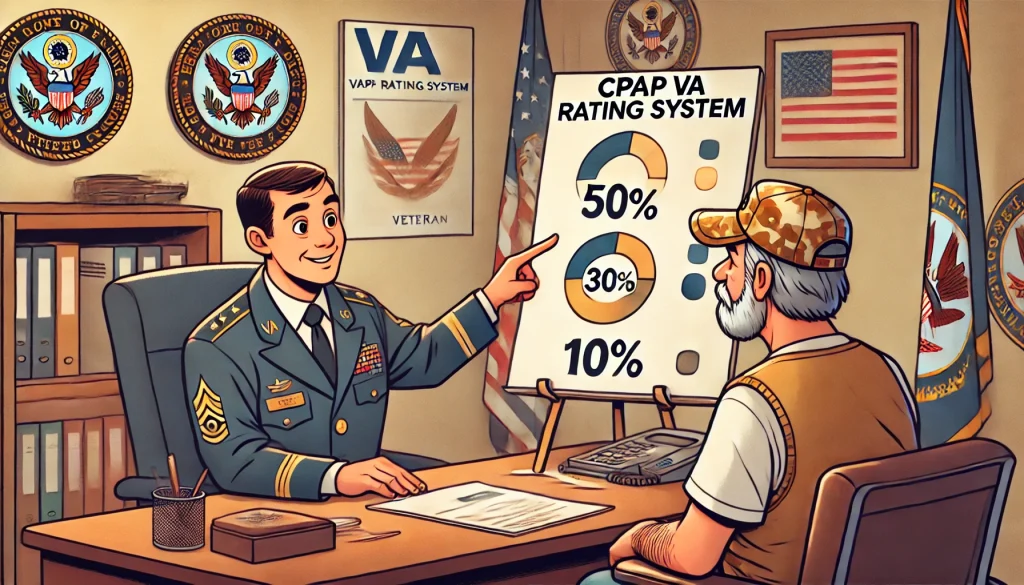Veterans diagnosed with sleep apnea may be eligible for VA disability benefits, especially if they use a CPAP machine as part of their treatment.
The CPAP VA rating depends on the severity of your condition and the impact it has on your ability to function. This article will explore the current VA sleep apnea rating, upcoming changes in 2024, and how veterans can connect sleep apnea to their military service for a successful claim.
VA Sleep Apnea Rating and CPAP Machines
The VA sleep apnea rating is determined based on the severity of the condition and whether a CPAP machine is required. CPAP (Continuous Positive Airway Pressure) machines are a common treatment for veterans suffering from obstructive sleep apnea. The ratings are typically categorized as follows:
- 50% disability rating: Assigned if the veteran requires the use of a CPAP machine.
- 30% disability rating: For veterans who experience persistent daytime hypersomnolence (excessive daytime sleepiness) but do not require a CPAP.
- 0% to 10% disability rating: For mild cases of sleep apnea with less severe symptoms.
For more details on how the VA rates sleep apnea and CPAP use, check out VA’s Proposed Disability Rating Updates.
Need Some More Help with your VA Disability?
Learn more about the VA Disability process and get help with our VA Disability Chatbot programmed and trained by AI

.
How to Win a Sleep Apnea VA Claim
Winning a sleep apnea VA claim requires a few critical steps:
- Medical Diagnosis: Ensure you have a clear diagnosis of sleep apnea from a VA or civilian doctor. The diagnosis must include a sleep study showing the severity of your condition.
- Service Connection: Show that your sleep apnea is related to your military service. This can be achieved by providing medical records or by showing that your sleep apnea developed or worsened due to military activities.
- Nexus Letter: A nexus letter from your healthcare provider can help establish that your sleep apnea is connected to your military service.
- CPAP Prescription: If you use a CPAP machine, ensure your medical records clearly show that it is prescribed for sleep apnea treatment.
To better understand how to navigate the VA disability claim process for sleep apnea, you can visit the following guide: How to Win a Sleep Apnea Claim.
VA Sleep Apnea Changes in 2024
Changes to the VA sleep apnea rating system may be implemented in 2024. The VA has proposed updates to the disability rating schedule for several conditions, including sleep apnea. These changes are likely to affect how veterans are rated based on the severity of their sleep apnea and whether they rely on a CPAP machine.
The proposed changes could potentially reduce the 50% rating for veterans who use a CPAP but show improvement in their overall condition. Veterans are encouraged to stay updated on these proposed changes and consult with a representative to ensure their disability rating is protected.
You can learn more about the proposed changes here: VA Sleep Apnea Rating Changes 2024.

How to Connect Sleep Apnea to Military Service
Connecting your sleep apnea to military service is a key factor in securing VA disability benefits. Here’s how you can strengthen your service connection:
- Service Medical Records: If you experienced sleep issues or were diagnosed with sleep apnea during active duty, your service medical records will be crucial in establishing a connection.
- Post-Service Medical Records: Even if your sleep apnea diagnosis came after your military service, a nexus letter from a healthcare provider linking your sleep apnea to your time in service can help establish a service connection.
For more information on service-connected sleep apnea, visit the VA’s Whole Health Library: VA Whole Health Sleep Apnea Guide.
VA Disability Ratings for Sleep Apnea
As of now, veterans diagnosed with sleep apnea and who use a CPAP machine are generally rated at 50% disability. Veterans who do not require a CPAP may receive a lower rating, depending on their symptoms. The VA sleep apnea disability rating reflects how much the condition affects a veteran’s ability to work and maintain daily activities.
The potential changes in 2024 may lower ratings for veterans who show improvement with CPAP use. However, veterans experiencing persistent symptoms such as daytime fatigue or cognitive impairment may still qualify for higher ratings. Veterans who believe their sleep apnea has worsened may request a re-evaluation to ensure they are receiving the correct compensation.
To explore disability ratings for sleep apnea, check out this helpful resource: VA Sleep Apnea Disability Ratings.
VA Sleep Apnea Claim: Steps to Take
If you are filing a VA sleep apnea claim, here are the steps you should follow:
- Gather Medical Evidence: Collect all medical records, including sleep study results and CPAP prescriptions. Ensure your doctor provides a clear diagnosis of sleep apnea and its severity.
- File VA Form 21-526EZ: This form is used to apply for VA disability compensation. Ensure that all relevant medical records and service connection documents are included.
- Request a C&P Exam: The Compensation and Pension (C&P) exam is an important step in determining your disability rating. Make sure to attend the exam and provide any additional information requested.
- Follow Up on Your Claim: You can track the status of your claim on the VA.gov portal. If additional evidence is requested, provide it promptly to avoid delays.
For more information on filing a sleep apnea VA claim, visit How to File a Claim.
